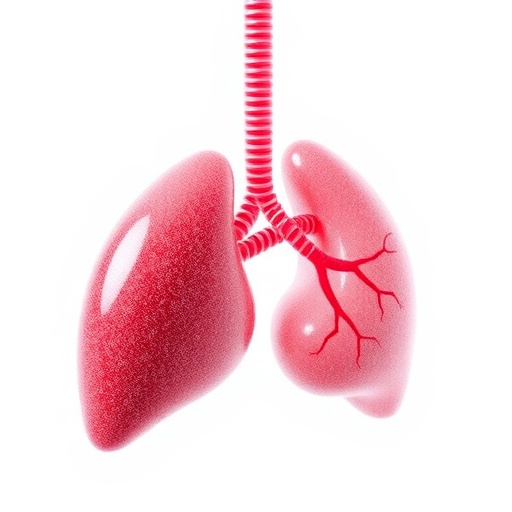In a groundbreaking advancement for liver cancer treatment, researchers have unveiled promising results using a novel combination therapy for patients suffering from unresectable hepatocellular carcinoma (uHCC). This therapy integrates hepatic arterial infusion chemotherapy (HAIC) with the immune checkpoint inhibitor camrelizumab and the targeted drug apatinib, aiming to convert advanced, inoperable tumors into ones amenable to surgical removal. The recent single-arm exploratory trial, conducted between 2021 and 2023, offers a compelling glimpse into a potential paradigm shift in the management of advanced liver cancer, an area notoriously resistant to traditional interventions.
Hepatocellular carcinoma remains one of the most lethal malignancies worldwide, largely due to late-stage diagnosis and limited therapeutic options once tumors reach an unresectable stage. Systemic therapies, including targeted agents and immune checkpoint inhibitors, have shown survival benefits but often fall short in achieving significant tumor downstaging. HAIC, which delivers high concentrations of chemotherapeutic agents directly into the liver’s arterial supply, has increasingly garnered attention as a locoregional approach with the potential to reduce tumor burden effectively while minimizing systemic toxicity.
This novel trial enrolled 19 patients diagnosed with advanced uHCC, all initially deemed unsuitable candidates for surgery. Participants received a carefully timed regimen combining apatinib, camrelizumab, and HAIC administered with the FOLFOX chemotherapy protocol, which includes oxaliplatin, leucovorin, and fluorouracil. The treatment cycles spanned 21-day intervals, extending to a maximum of eight cycles to maximize clinical response. Such an approach reflects an intricate balance of leveraging local chemotherapy infusion alongside systemic immune activation and angiogenesis inhibition.
Notably, the pathological assessments post-surgery revealed that a third of these resected tumors demonstrated a major pathological response to the treatment, including two cases achieving complete pathological remission. This indicates that the combination therapy not only shrinks tumors radiographically but can also eliminate microscopic disease, an encouraging sign for long-term survival prospects. Furthermore, objective response rates approximated 47%, with disease control rates nearing 90%, according to RECIST (Response Evaluation Criteria In Solid Tumors) standards, highlighting a robust anti-tumor effect.
Importantly, the safety profile of this demanding regimen was manageable, albeit with considerable but expected toxicities. Over 70% of patients experienced grade 3 or higher treatment-related adverse events. Elevated liver enzymes and increased lymphocyte counts were the most frequent severe side effects. Encouragingly, no treatment-related mortality occurred, affirming that with vigilant monitoring and supportive care, this therapeutic strategy is tolerable for a majority of patients.
The underlying scientific rationale for this triple combination rests on synergistic mechanisms: HAIC delivers concentrated cytotoxic drugs directly to tumor vasculature, apatinib acts as a potent anti-angiogenic agent restricting tumor blood supply by inhibiting vascular endothelial growth factor receptor-2 (VEGFR-2), and camrelizumab unleashes the immune system by blocking PD-1 immune checkpoints. Together, these agents mount a multifaceted attack capable of overcoming tumor immune evasion and chemoresistance, which are critical challenges in advanced HCC.
This trial’s findings pave the way for further exploration of HAIC combined with immunotherapy and targeted agents as a conversion strategy, opening new doors to potentially curative surgery for patients previously resigned to palliative care. While survival data remain immature, the initial signals of tumor control and margin-negative resection bode well for improved outcomes. Future randomized controlled trials will be essential to validate these findings, optimize dosing schedules, and refine patient selection criteria.
Given the complexity of hepatocellular carcinoma’s biology and the heterogeneous nature of patient responses, the multidisciplinary integration of locoregional treatment, targeted therapy, and immunotherapy represents a tailored therapeutic frontier. This approach underscores a shift toward personalized oncology where combination regimens can be fine-tuned to elicit maximal tumor regression while maintaining quality of life.
The study also raises intriguing questions about the timing and sequencing of therapies. Administering camrelizumab shortly after apatinib initiation and preceding hepatic arterial infusion likely maximizes immune modulation and tumor microenvironment alteration, facilitating enhanced efficacy. Such precise coordination highlights the importance of understanding pharmacodynamics and immune interactions in devising effective treatment algorithms.
Beyond clinical efficacy, the trial exemplifies how advancements in interventional radiology and immuno-oncology can converge to extend the boundaries of cancer care. Hepatic artery infusion requires specialized expertise and infrastructure, underscoring the need for centers of excellence capable of delivering complex multimodal therapies safely and effectively.
While this treatment strategy currently applies to a select cohort of patients with unresectable hepatocellular carcinoma, its success may inspire similar combinatory frameworks for other solid tumors where surgical options are limited by advanced disease. The concept of conversion therapy, pushing tumors from inoperable to operable states, embodies a proactive and aggressive stance in cancer management.
In summary, the integration of HAIC using the FOLFOX regimen with camrelizumab and apatinib represents a significant leap forward in the therapeutic landscape of advanced hepatocellular carcinoma. The trial’s encouraging outcomes justify continued investigation and hope for a new standard of care that can improve survival and quality of life for a challenging patient population. As the oncology community anticipates further data, this innovative treatment offers a beacon of optimism for patients facing limited options.
Subject of Research: Conversion therapy for unresectable hepatocellular carcinoma using hepatic arterial infusion chemotherapy combined with immune checkpoint inhibition and targeted therapy.
Article Title: Hepatic artery infusion chemotherapy combined with camrelizumab and apatinib as conversion therapy for patients with unresectable hepatocellular carcinoma: a single-arm exploratory trial.
Article References:
Yalikun, K., Li, Z., Zhang, J. et al. Hepatic artery infusion chemotherapy combined with camrelizumab and apatinib as conversion therapy for patients with unresectable hepatocellular carcinoma: a single-arm exploratory trial. BMC Cancer 25, 838 (2025). https://doi.org/10.1186/s12885-025-14250-5
Image Credits: Scienmag.com
DOI: https://doi.org/10.1186/s12885-025-14250-5
Tags: advanced liver cancer managementapatinib and camrelizumab combination therapyclinical trial results for liver cancerhepatic arterial infusion chemotherapyimmune checkpoint inhibitorsliver cancer treatmentlocoregional therapy for liver cancernovel combination therapysurgical removal of tumorstargeted cancer drugstumor downstaging strategiesunresectable hepatocellular carcinoma





